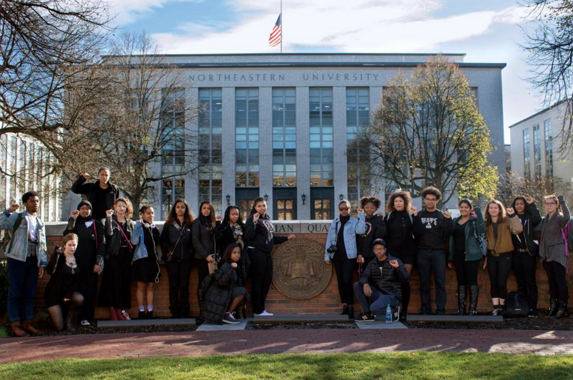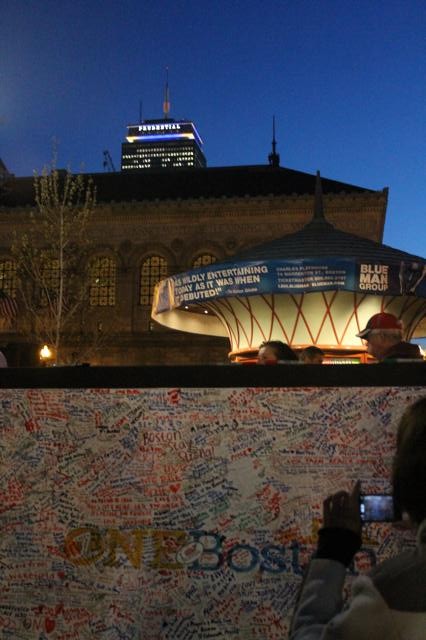“Injustice anywhere is a threat to justice everywhere.” – Martin Luther King, Jr.
Early last week, I was lucky enough to witness and participate in #WAKEUPWORLD, a Boston march in solidarity with students of color all over the country protesting institutionalized discrimination within schools and universities. Representatives of 17 schools, including Northeastern, walked through Boston Common and along Beacon Street, leading chants such as, “We pay for education, not for discrimination,” “Out of the schools, into the streets,” and “Black lives matter.” It was an outstanding show of support, organized and led by a coalition of black students from all over Boston.
The #WAKEUPWORLD event strongly represented the interests of black students but also worked hard to include other students of color. Prior to a march through the Boston streets, the leaders shared with the demonstrators a very comprehensive and well-thought-out list of demands for our universities. These demands included (but were not limited to): a mandatory cultural inclusion and racial awareness curriculum curated by students, staff, and faculty of color; amended policies for appointing university leadership that would allow increased participation from campus communities; review of hiring policies and changes that would allow for increased diversity; increase in funding for programs that support higher retention for marginalized students; and increase in funding for counseling and mental health professionals of color as well as personnel for social justice resource centers.
Tali Muwwakkil, a member of Northeastern Black Student Association’s executive board, organized the Northeastern University delegation to the event. Her interpretation of the purpose of the event and the underlying movement was powerful: “I would say our message is that we need to come together as a unified front to show the world that we aren’t joking. We’re ‘sick and tired of being sick and tired’ and it’s time for us to accept the responsibility of initiating change.”
The environment of the event ranged from fun, with the students clapping and dancing along to the rhythm of the chants, to serious, as they stopped traffic in Copley Square and held hands in a moment of silence to honor the victims of discrimination and racism. There was an emphasis on defined goals for more collaboration within the Boston community and the country as a whole, as well as on shared stories. Tali put it best:
“Even though you may experience something a little different, we’re all fighting the same fight. It’s just different battlefields, but it’s the same war. I do hope the collaborative spirit didn’t end with this event. You have to be seen and you have to be heard and what better way to do it than with a big crowd of people? We can either choose to take the responsibility to effect change in our day-to-day lives or we can ignore it and things can go back to how they were… or get worse.”
It is a significant and exhausting task to constantly educate others on your struggle, and the Boston community is lucky to have such strong leaders that rise up to take it upon themselves. Because of them, attendees of #WAKEUPWORLD were able to learn about the problems that black students face daily, and were given the chance to join a diverse group of students from all over Boston in a common cause. It was an extraordinary opportunity, and that “collaborative spirit” was overwhelmingly present. This demonstration of solidarity, however, was lacking in one particular respect; among that mass of students, there appeared to be maybe six or seven of Asian descent, and overall, only ten or so non-black people of color.
This, in my experience, is not an isolated occurrence. There is often a disturbing lack of alliance with movements for black lives in the larger PoC discourse. As an Indian-American, I understand the frustration felt by many Asian-Americans when conversations about race are polarized and characterized as black or white. But why are we always competing instead of collaborating? We spend so much time trying to change the narrative to include our voices that we forget that we often stifle those of other oppressed groups. We must aim to be better allies in other issues as we work to advocate better for ourselves.
There has been a lot of dialogue at Northeastern between different cultural groups, most recently in meetings of the Students Against Institutional Discrimination or events conducted by EMPOWER (no, not the fundraising campaign), “an initiative designed to link communities, ignite social consciousness, and inspire leadership among students of color.”[1] And we talk constantly about the need to facilitate interaction between different student groups, not just within. In surroundings that classify us as an “other” category, we cling to the comfortable, enveloping ourselves in a community of those who share our experiences. But we need to expand that definition of shared experience. In a school that can definitely be characterized as a white institution, solidarity is necessary among groups whose stories and demands are often labeled as “niche” or “special interest.” This need for alliance should not be limited to students of color, of course, but all marginalized groups and their representatives who have the agenda of creating a more inclusive campus.
I’m happy to belong to the Asian-American community on campus, and I deeply value the support, companionship, and mutual understanding I enjoy with my friends of South Asian descent. But it is so easy to get caught up in just the struggles of being Indian, of being Asian, of being a woman, and to leave out the larger conversation. It’s a lot simpler to complain about where the world does me wrong than it is to educate myself about how it affects other people. There is an inherent quality within the Asian community that discourages active protest of the norm – being the model minority encourages many to stay silent and settle for a slightly higher place in the ladder of white supremacy. And this dual position of privilege and marginalization allows us to never truly be equal, but to accept what the media tells us about protests against racism being unreasonable and violent, and to silently or actively chalk up our achievements as a minority community to “better values.”
This tendency comes into play in issues like affirmative action, a reaction to a system that has always favored white applicants, whether in educational institutions or in the workplace. We must remember that programs that work to include underrepresented groups do not hurt Asian-Americans and other “model minorities;” white supremacy does. And just as Asian-Americans are stereotyped in certain roles or fields and discriminated against in others, people of other races are judged and classified. Lastly and most sadly, mass incarceration, housing discrimination, and police brutality occur overwhelmingly against black and sometimes Latin@ people. We shouldn’t wait for those of our particular group to be affected in order to care.
Being a member of a particular minority group entails facing discrimination, but it can also involve a certain degree of privilege. People cannot limit their dialogue exclusively to situations in which they are the victims of oppression; they must acknowledge where they are its perpetrators. As non-black people of color, we should not wait for formal invitations to ally ourselves with pro-black movements. We should educate other groups about our struggles, yes, but we should also give them a platform to voice their own. There are issues that systematically and disproportionately affect particular groups of color. Those who understand the minority experience should engage actively with other marginalized groups, not remain silent or try to shout over them. Sharing statuses, having the same dialogues, and writing columns is all good, but more definite and targeted advocacy and allyship is necessary.
This is a time of crisis, a cathartic opportunity to create real change. In order to advance this era, it is necessary that we hear from black girls who feel doubly persecuted, black men who must watch every move they make, black mothers and fathers who fear for their children every moment they step out on the street. The whitewashing of our narrative both in past and present is an injustice, and it is our collective responsibility to uncover what it obscures, not to pick and choose what perceptions we challenge. In settings like Northeastern, communities of color, though separately considered minority groups, together could be an unstoppable force of change. And in times like these, without listening to and standing alongside our black brothers and sisters in their struggle, it is impossible for people of color to effectively dismantle the system of white supremacy.
If you are interested in joining an email group connecting black students across the United States, please email the Northeastern Black Student Association at nbsaeboard@gmail.com. Thank you to Tali Muwwakkil for her contributions.



